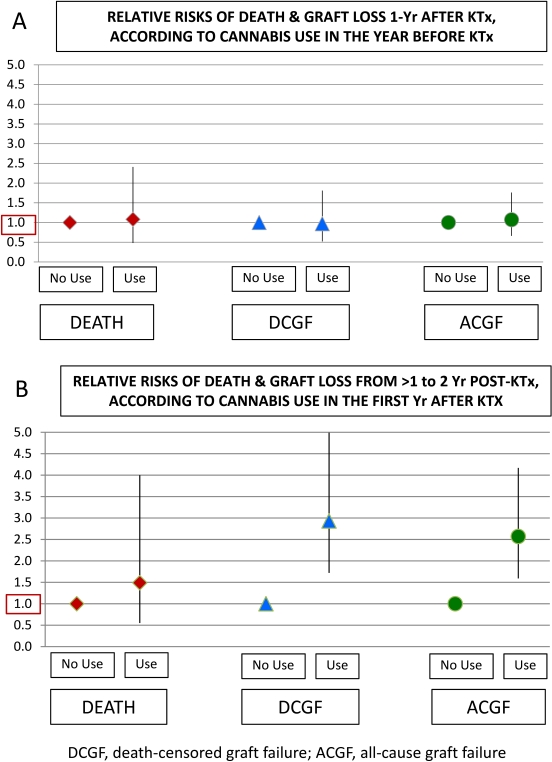Cannabis Dependence or Abuse before and after Kidney Transplantation: Implications for Post-Transplant Outcomes
K. Lentine,1 T. Alhamad,2 N. Lam,3 A. Naik,4 F. Koraishy,1 H. Randall,1 D. Segev,5 V. Dharnidharka,2 D. Brennan,5 B. Kasiske,6 R. Ouseph,1 M. Schnitzler.1
1Saint Louis Univ, St. Louis
2Washington Univ, St. Louis
3Univ Alberta, Edmonton, Canada
4Univ Michigan, Ann Arbor
5Johns Hopkins, Baltimore
6Hennepin County Med Ctr, Minneapolis.
Meeting: 2018 American Transplant Congress
Abstract number: 124
Keywords: Kidney transplantation, Outcome, Psychiatric comorbidity, Risk factors
Session Information
Session Name: Concurrent Session: Kidney Psychosocial - 1
Session Type: Concurrent Session
Date: Sunday, June 3, 2018
Session Time: 4:30pm-6:00pm
 Presentation Time: 4:30pm-4:42pm
Presentation Time: 4:30pm-4:42pm
Location: Room 210
Currently, transplant centers vary in screening practices for marijuana use and requirements for abstinence before kidney transplantation
We examined billing claims and linked SRTR data for 52,689 Medicare-insured kidney transplant recipients to identify diagnoses of cannabis dependence or abuse (CDOA, International Classification of Diseases-9 304.3, 305.2) in the year before and after transplant. Associations of CDOA with post-transplant death and graft failure (adjusted hazard ratio, 95% LCL aHR 95% UCL) were quantified by multivariate Cox regression including adjustment for recipient, donor, and transplant factors, and propensity for CDOA.
CDOA diagnoses were uncommon, found in 0.5% and 0.3% in the year before and after transplant, respectively. Diagnoses of CDOA before and after transplant declined with older recipient age, and was more common in men, African Americans, those with less than college education<ins cite="mailto:Ngan%20Lam" datetime="2017-11-14T20:29">,</ins> and unemployed. After multivariate and propensity adjustment, CDOA in the year before transplant was not associated with death or graft survival in the year after transplant. However, CDOA in the first year post-transplant was associated with three-times the risk of death-censored graft failure (aHR 1.722.934.99) and 2.5-times the risk of all-cause graft loss (aHR 1.592.574.17) in the subsequent year.
Diagnoses of CDOA are uncommon among kidney transplant recipients, and likely reflect a select subgroup of cannabis users who reach clinical attention. While associations likely in part reflect associated conditions or behaviors, CDOA in the year after transplant appears to have prognostic importance for subsequent allograft function.
CITATION INFORMATION: Lentine K., Alhamad T., Lam N., Naik A., Koraishy F., Randall H., Segev D., Dharnidharka V., Brennan D., Kasiske B., Ouseph R., Schnitzler M. Cannabis Dependence or Abuse before and after Kidney Transplantation: Implications for Post-Transplant Outcomes Am J Transplant. 2017;17 (suppl 3).
To cite this abstract in AMA style:
Lentine K, Alhamad T, Lam N, Naik A, Koraishy F, Randall H, Segev D, Dharnidharka V, Brennan D, Kasiske B, Ouseph R, Schnitzler M. Cannabis Dependence or Abuse before and after Kidney Transplantation: Implications for Post-Transplant Outcomes [abstract]. https://atcmeetingabstracts.com/abstract/cannabis-dependence-or-abuse-before-and-after-kidney-transplantation-implications-for-post-transplant-outcomes/. Accessed February 18, 2026.« Back to 2018 American Transplant Congress

